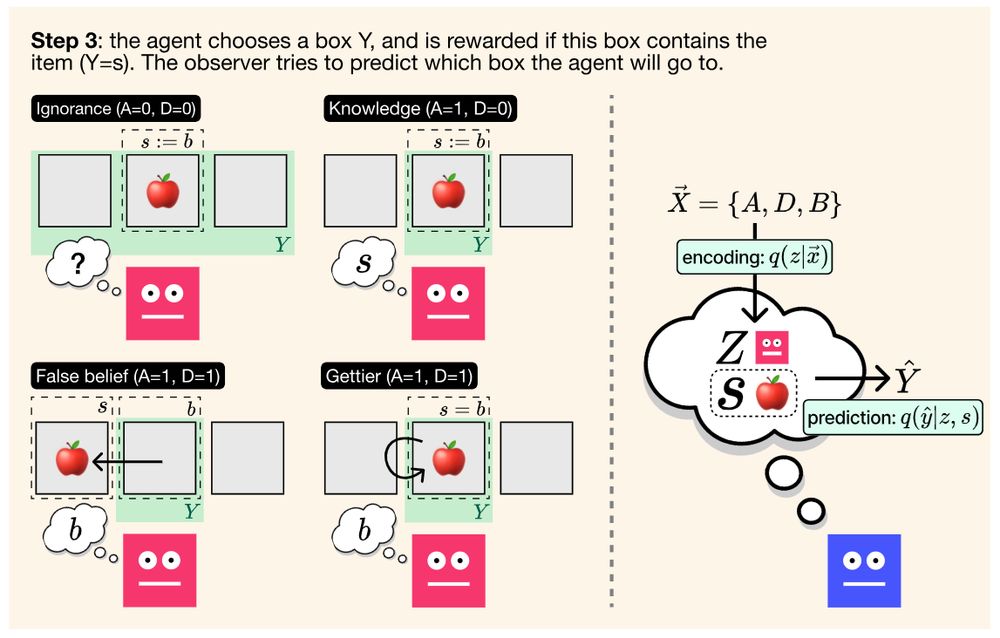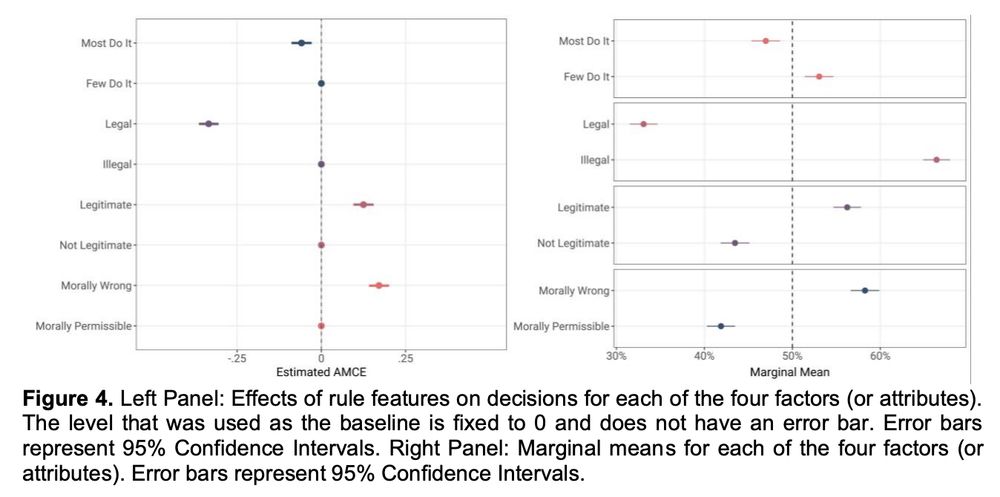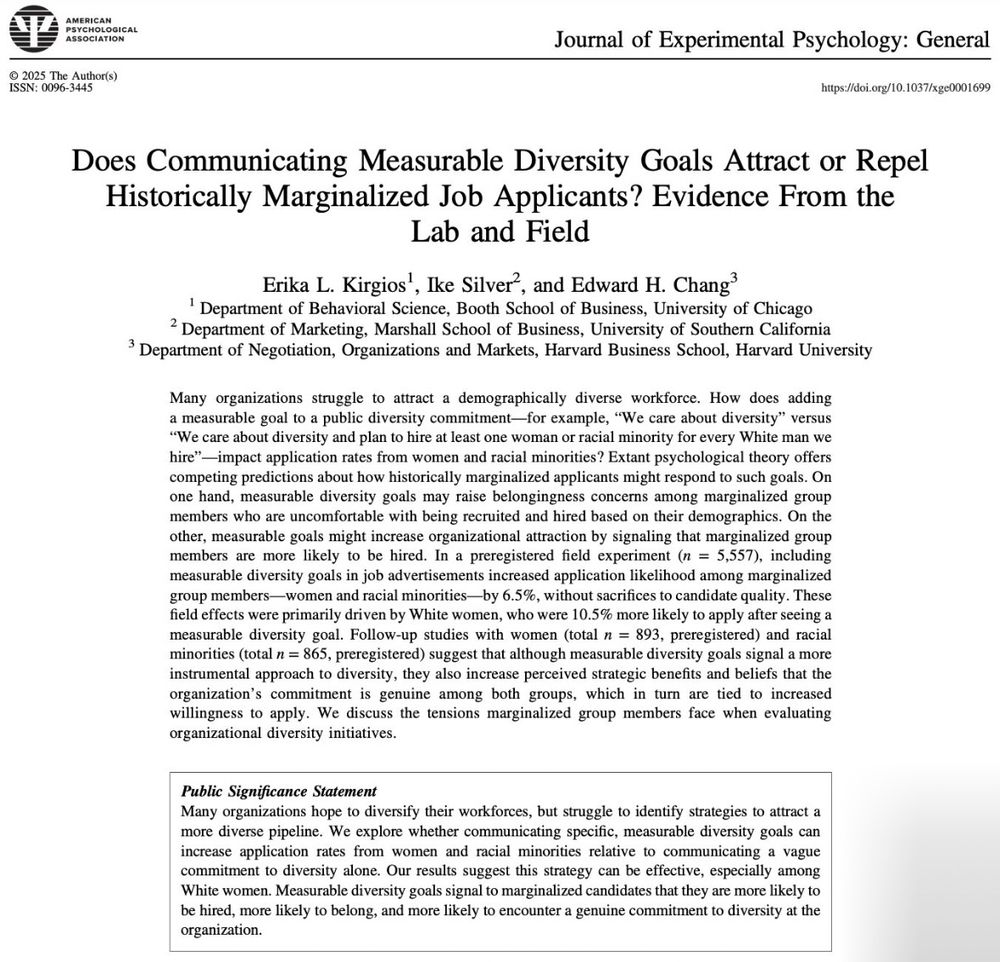Corey Cusimano
@cusimano.bsky.social
Assistant Professor of Marketing at Yale University.
I study how people think about thinking, and how people think about justice.
Website: www.coreycusimano.net
I study how people think about thinking, and how people think about justice.
Website: www.coreycusimano.net
Reposted by Corey Cusimano
🚨From Jay Naborn & Jonathan E. Bogard:
The Pick-the-Winner-Picker Heuristic: Preference for Categorically Correct Forecasts
The Pick-the-Winner-Picker Heuristic: Preference for Categorically Correct Forecasts

Sage Journals: Discover world-class research
Subscription and open access journals from Sage, the world's leading independent academic publisher.
journals.sagepub.com
November 5, 2025 at 1:58 PM
🚨From Jay Naborn & Jonathan E. Bogard:
The Pick-the-Winner-Picker Heuristic: Preference for Categorically Correct Forecasts
The Pick-the-Winner-Picker Heuristic: Preference for Categorically Correct Forecasts
Reposted by Corey Cusimano
Excited by our new work estimating the empowerment of LLM-based agents in text and code. Empowerment is the causal influence an agent has over its environment and measures an agent's capabilities without requiring knowledge of its goals or intentions.

October 1, 2025 at 4:27 AM
Excited by our new work estimating the empowerment of LLM-based agents in text and code. Empowerment is the causal influence an agent has over its environment and measures an agent's capabilities without requiring knowledge of its goals or intentions.
Reposted by Corey Cusimano
Major new paper by finds implicit measures like the IAT are no better than asking people directly about their biases. After decades of avoiding self-reports, turns out our sophisticated replacement tools work no better than what we abandoned. New post!

The Great Implicit Bias Bamboozle
Where were you when you first learned about implicit bias?
open.substack.com
September 10, 2025 at 12:46 PM
Major new paper by finds implicit measures like the IAT are no better than asking people directly about their biases. After decades of avoiding self-reports, turns out our sophisticated replacement tools work no better than what we abandoned. New post!
Reposted by Corey Cusimano
New letter by @minzlicht.bsky.social and I forthcoming in TiCS on whether neurometabolic costs are necessary to explain cognitive fatigue. While the origins of fatigue may turn out to be metabolic, we argue there isn’t yet sufficient evidence for such theories. osf.io/preprints/ps...

August 10, 2025 at 7:53 PM
New letter by @minzlicht.bsky.social and I forthcoming in TiCS on whether neurometabolic costs are necessary to explain cognitive fatigue. While the origins of fatigue may turn out to be metabolic, we argue there isn’t yet sufficient evidence for such theories. osf.io/preprints/ps...
What makes people feel entitled to rewards—the effort they put into their work or the outcomes they achieve?
Out now in PNAS; with Jin Kim and Jared Wong:
Achievement.
Effort seems to matter very little (if at all).
www.pnas.org/doi/10.1073/...
Out now in PNAS; with Jin Kim and Jared Wong:
Achievement.
Effort seems to matter very little (if at all).
www.pnas.org/doi/10.1073/...

May 8, 2025 at 9:51 PM
What makes people feel entitled to rewards—the effort they put into their work or the outcomes they achieve?
Out now in PNAS; with Jin Kim and Jared Wong:
Achievement.
Effort seems to matter very little (if at all).
www.pnas.org/doi/10.1073/...
Out now in PNAS; with Jin Kim and Jared Wong:
Achievement.
Effort seems to matter very little (if at all).
www.pnas.org/doi/10.1073/...
Reposted by Corey Cusimano
Our new paper with Max Taylor-Davies introduces a resource-rational model of Theory of Mind.
The model can explain many of the successes and failures of mindreading in human adults and children, and non-human primates. 🧵
The model can explain many of the successes and failures of mindreading in human adults and children, and non-human primates. 🧵




March 31, 2025 at 4:45 PM
Our new paper with Max Taylor-Davies introduces a resource-rational model of Theory of Mind.
The model can explain many of the successes and failures of mindreading in human adults and children, and non-human primates. 🧵
The model can explain many of the successes and failures of mindreading in human adults and children, and non-human primates. 🧵
Reposted by Corey Cusimano
Really proud of this new work out @psychscience.bsky.social. Led by the amazing but bluesky-less Amanda Geiser and with @deborahsmall.bsky.social.
We show that when comparing moral wrongs, people are (much) more willing to “scale up” than to “scale down” condemnation and punishment…
We show that when comparing moral wrongs, people are (much) more willing to “scale up” than to “scale down” condemnation and punishment…

March 22, 2025 at 6:20 PM
Really proud of this new work out @psychscience.bsky.social. Led by the amazing but bluesky-less Amanda Geiser and with @deborahsmall.bsky.social.
We show that when comparing moral wrongs, people are (much) more willing to “scale up” than to “scale down” condemnation and punishment…
We show that when comparing moral wrongs, people are (much) more willing to “scale up” than to “scale down” condemnation and punishment…
Reposted by Corey Cusimano
Our incredibly short (5 page) paper on intuitions about consent — with Joanna Demaree-Cotton and @rosesomm.bsky.social
We find cases where people agree that both:
(a) There’s a sense in a which a person clearly consented
(b) In deeper sense, she did not consent at all
osf.io/63d8s
We find cases where people agree that both:
(a) There’s a sense in a which a person clearly consented
(b) In deeper sense, she did not consent at all
osf.io/63d8s

February 26, 2025 at 2:58 PM
Our incredibly short (5 page) paper on intuitions about consent — with Joanna Demaree-Cotton and @rosesomm.bsky.social
We find cases where people agree that both:
(a) There’s a sense in a which a person clearly consented
(b) In deeper sense, she did not consent at all
osf.io/63d8s
We find cases where people agree that both:
(a) There’s a sense in a which a person clearly consented
(b) In deeper sense, she did not consent at all
osf.io/63d8s
Reposted by Corey Cusimano
Are you a junior faculty member interested in spending 2-4 weeks at Princeton Psych? Please apply for our Microsabbatical program! It’s a fully funded visit for professional development and creating long-term collaborations.
psych.princeton.edu/diversity/mi...
psych.princeton.edu/diversity/mi...
Microsabbaticals at Princeton Psychology
Microsabbaticals at Princeton Psychology provide a several-week-long visit to our department for early-career faculty from groups that are historically under-represented in academia. The program focus...
psych.princeton.edu
February 19, 2025 at 8:51 PM
Are you a junior faculty member interested in spending 2-4 weeks at Princeton Psych? Please apply for our Microsabbatical program! It’s a fully funded visit for professional development and creating long-term collaborations.
psych.princeton.edu/diversity/mi...
psych.princeton.edu/diversity/mi...
Reposted by Corey Cusimano
There hasn’t been nearly enough appreciation for this amazing paper by Clark Barrett and
@rebeccasaxe.bsky.social
Anthropologists have observed people in certain cultures blaming agents for behavior without regard to mental states (intent, knowledge, etc.). Why does this happen?
@rebeccasaxe.bsky.social
Anthropologists have observed people in certain cultures blaming agents for behavior without regard to mental states (intent, knowledge, etc.). Why does this happen?
saxelab.mit.edu
February 14, 2025 at 7:57 PM
There hasn’t been nearly enough appreciation for this amazing paper by Clark Barrett and
@rebeccasaxe.bsky.social
Anthropologists have observed people in certain cultures blaming agents for behavior without regard to mental states (intent, knowledge, etc.). Why does this happen?
@rebeccasaxe.bsky.social
Anthropologists have observed people in certain cultures blaming agents for behavior without regard to mental states (intent, knowledge, etc.). Why does this happen?
Reposted by Corey Cusimano
New paper in Psychological Review!
In "Causation, Meaning, and Communication" Ari Beller (cicl.stanford.edu/member/ari_b...) develops a computational model of how people use & understand expressions like "caused", "enabled", and "affected".
📃 osf.io/preprints/ps...
📎 github.com/cicl-stanfor...
🧵
In "Causation, Meaning, and Communication" Ari Beller (cicl.stanford.edu/member/ari_b...) develops a computational model of how people use & understand expressions like "caused", "enabled", and "affected".
📃 osf.io/preprints/ps...
📎 github.com/cicl-stanfor...
🧵

February 12, 2025 at 6:25 PM
New paper in Psychological Review!
In "Causation, Meaning, and Communication" Ari Beller (cicl.stanford.edu/member/ari_b...) develops a computational model of how people use & understand expressions like "caused", "enabled", and "affected".
📃 osf.io/preprints/ps...
📎 github.com/cicl-stanfor...
🧵
In "Causation, Meaning, and Communication" Ari Beller (cicl.stanford.edu/member/ari_b...) develops a computational model of how people use & understand expressions like "caused", "enabled", and "affected".
📃 osf.io/preprints/ps...
📎 github.com/cicl-stanfor...
🧵
Reposted by Corey Cusimano
The MIT Open Encyclopedia of Cognitive Science is a growing resource, expertly edited and designed, with high quality contributors (OK OK I am one of them) oecs.mit.edu

Open Encyclopedia of Cognitive Science
The Open Encyclopedia of Cognitive Science is a new, multidisciplinary guide to understanding the mind: a freely-available, growing collection of peer-reviewed articles introducing key topics to a bro...
oecs.mit.edu
February 11, 2025 at 9:59 AM
The MIT Open Encyclopedia of Cognitive Science is a growing resource, expertly edited and designed, with high quality contributors (OK OK I am one of them) oecs.mit.edu
Reposted by Corey Cusimano
When someone only has one sensible option available, do they have a choice at all? @cusimano.bsky.social and @tanialombrozo.bsky.social explore how we experience freedom: https://buff.ly/4gj0njy

January 23, 2025 at 6:26 PM
When someone only has one sensible option available, do they have a choice at all? @cusimano.bsky.social and @tanialombrozo.bsky.social explore how we experience freedom: https://buff.ly/4gj0njy
Reposted by Corey Cusimano
Our paper on if you can incentivize rule induction in humans with money is finally out (answer is: it appears to be a very weak/0-ish effect in contrast to the huge effect of financial incentives on rote, repetitive tasks). credit to pamop, ben newell & dan bartels psycnet.apa.org/fulltext/202...
APA PsycNet
psycnet.apa.org
January 21, 2025 at 5:06 PM
Our paper on if you can incentivize rule induction in humans with money is finally out (answer is: it appears to be a very weak/0-ish effect in contrast to the huge effect of financial incentives on rote, repetitive tasks). credit to pamop, ben newell & dan bartels psycnet.apa.org/fulltext/202...
Good opportunity to work with some amazing scholars!
Exciting opportunity! We’re hiring *two* Post-Doctoral Fellows (1) Social-Cog Psych (w ABM interest) & (2) NLP/Computational Social Science @UWaterloo. Work on #culture, #judgment, #decisionmaking with wiseminds.uwaterloo.ca
Learn more & apply: uwaterloo.ca/wisdom-and-c...
Learn more & apply: uwaterloo.ca/wisdom-and-c...
wiseminds
wiseminds.uwaterloo.ca
January 18, 2025 at 5:45 PM
Good opportunity to work with some amazing scholars!
Reposted by Corey Cusimano
what counts as breaking a rule? you might think this q is easy, but people actually integrate signals from morality, legality, punishability, and normativity to figure it out, new preprint w/ @jowylie.bsky.social & dries bostyn osf.io/preprints/ps... #psychscisky #cognition #socpsyc #philsky

January 3, 2025 at 5:22 PM
what counts as breaking a rule? you might think this q is easy, but people actually integrate signals from morality, legality, punishability, and normativity to figure it out, new preprint w/ @jowylie.bsky.social & dries bostyn osf.io/preprints/ps... #psychscisky #cognition #socpsyc #philsky
Reposted by Corey Cusimano
How do job seekers react when orgs quantify their diversity commitments? In a 🚨new paper🚨 with @ikesilver.bsky.social & Edward Chang, we explore competing predictions about how women and racial minorities react to measurable goals vs. vague, values-focused commitments.

January 16, 2025 at 3:15 PM
How do job seekers react when orgs quantify their diversity commitments? In a 🚨new paper🚨 with @ikesilver.bsky.social & Edward Chang, we explore competing predictions about how women and racial minorities react to measurable goals vs. vague, values-focused commitments.
Reposted by Corey Cusimano
Recently accepted by #QJE, “Cognitive Endurance as Human Capital,” by Brown(@clbrown.bsky.social), Kaur, Kingdon, and Schofield: doi.org/10.1093/qje/...
Validate User
doi.org
December 28, 2024 at 12:00 PM
Recently accepted by #QJE, “Cognitive Endurance as Human Capital,” by Brown(@clbrown.bsky.social), Kaur, Kingdon, and Schofield: doi.org/10.1093/qje/...
Reposted by Corey Cusimano
Classic thought experiments have convinced many philosophers that second-order desires have a special significance
But our intuitions about these thought experiments are driven not by the second-order desires but by something unrelated and much more fundamental
Blog post: xphi.net/2024/12/19/s...
But our intuitions about these thought experiments are driven not by the second-order desires but by something unrelated and much more fundamental
Blog post: xphi.net/2024/12/19/s...

December 19, 2024 at 2:44 PM
Classic thought experiments have convinced many philosophers that second-order desires have a special significance
But our intuitions about these thought experiments are driven not by the second-order desires but by something unrelated and much more fundamental
Blog post: xphi.net/2024/12/19/s...
But our intuitions about these thought experiments are driven not by the second-order desires but by something unrelated and much more fundamental
Blog post: xphi.net/2024/12/19/s...

